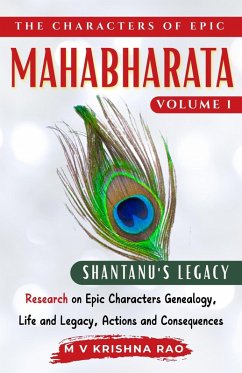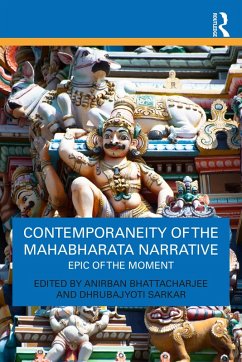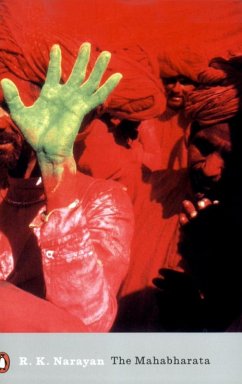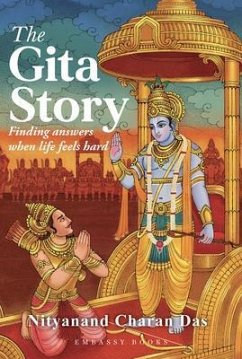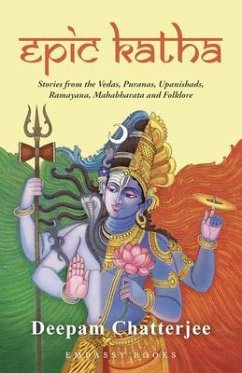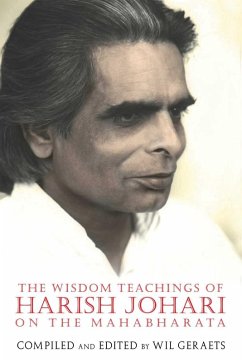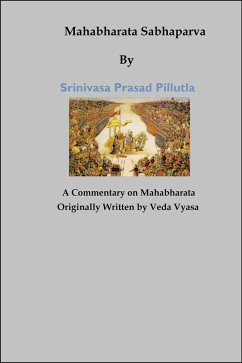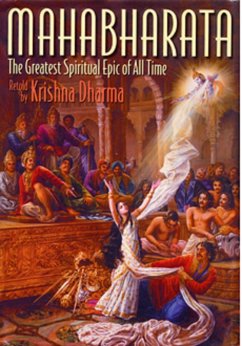
The Characters of Epic Mahabharata Volume 2 (eBook, ePUB)

PAYBACK Punkte
0 °P sammeln!
The Kaurava LegacyInto the Heart of Darkness: Understanding the Epic's Most Complex CharactersThe second volume of this comprehensive four-part series delves into the most morally complex territory of the Mahabharata-the lives, motivations, and tragic destinies of the Kaurava faction and its allies. Here, in the shadows cast by Dharma's light, we encounter characters whose complexity defies simple categorisation as heroes or villains, revealing instead the profound psychological insight that makes the Mahabharata humanity's most significant exploration of moral ambiguity.The Architecture of An...
The Kaurava Legacy
Into the Heart of Darkness: Understanding the Epic's Most Complex Characters
The second volume of this comprehensive four-part series delves into the most morally complex territory of the Mahabharata-the lives, motivations, and tragic destinies of the Kaurava faction and its allies. Here, in the shadows cast by Dharma's light, we encounter characters whose complexity defies simple categorisation as heroes or villains, revealing instead the profound psychological insight that makes the Mahabharata humanity's most significant exploration of moral ambiguity.
The Architecture of Antagonism
This volume examines twelve pivotal figures whose choices ignite and sustain the epic's central conflict. Unlike conventional antagonists driven by pure malice, these characters embody the tragedy of noble impulses corrupted by circumstance, blind loyalty, and the inexorable pull of fate toward destruction.
The Blind Court of Hastinapura comes alive through the intertwined destinies of Dhritarashtra, whose physical blindness mirrors his moral blindness; Gandhari, whose self-imposed blindness becomes both supreme sacrifice and tragic limitation; Vidura, the wise counsellor whose dharmic vision cannot prevent catastrophe; and Sanjaya, the divine chronicler who witnesses the war's unfolding with supernatural sight yet remains powerless to alter its course.
The Princes of Destruction emerge through the psychological portraits of Duryodhana, the crown prince whose genuine love for friends coexists with devastating pride; Dussasana, whose actions plumb the depths of adharma; and Vikarna, the lone Kaurava voice of conscience whose moral clarity cannot overcome familial loyalty.
The Architects of Manipulation reveal themselves in Shakuni, the uncle whose chess-like machinations transform personal vengeance into civilizational catastrophe, demonstrating how individual trauma can metastasize into collective destruction.
Beyond Simple Moral Categories
This volume's most significant achievement lies in its refusal to reduce these complex figures to convenient moral archetypes. Instead, it reveals how the Mahabharata's supposed "villains" often possess qualities that command our admiration-Duryodhana's unwavering friendship, Karna's dignity in the face of social rejection, Gandhari's self-sacrifice, Ashwatthama's filial devotion.
The Web of Interconnected Destinies
The Kaurava story cannot be understood in isolation. This volume examines the complex web of alliances and conflicts involving the Gandharas, Madras, and other royal families about the central conflict. These relationships reveal that the war in the Mahabharata is not just a family feud; it is a civilizational crisis in which traditional bonds of kinship, loyalty, and Dharma are tested to their limits.
Scholarly Rigour Meets Human Compassion
Drawing exclusively from scriptural sources-the Mahabharata itself and corroborating Puranic literature-this analysis maintains rigorous academic standards while approaching these characters with the compassion necessary to understand their full humanity. Every interpretation is supported by specific textual citations and cross-referenced across multiple authoritative translations.
The methodology combines genealogical research, psychological analysis, and dharmic assessment to create comprehensive portraits that honour both the complexity of the characters and the sophistication of their ancient creators.
The Continuing Journey
As the second volume in this four-part exploration, this work builds upon the foundational understanding established in Volume 1 while preparing readers for the heroic Yadava narratives (Volume 3) and the dharmic struggles of the Pandavas (Volume 4) that complete this comprehensive character study.
Into the Heart of Darkness: Understanding the Epic's Most Complex Characters
The second volume of this comprehensive four-part series delves into the most morally complex territory of the Mahabharata-the lives, motivations, and tragic destinies of the Kaurava faction and its allies. Here, in the shadows cast by Dharma's light, we encounter characters whose complexity defies simple categorisation as heroes or villains, revealing instead the profound psychological insight that makes the Mahabharata humanity's most significant exploration of moral ambiguity.
The Architecture of Antagonism
This volume examines twelve pivotal figures whose choices ignite and sustain the epic's central conflict. Unlike conventional antagonists driven by pure malice, these characters embody the tragedy of noble impulses corrupted by circumstance, blind loyalty, and the inexorable pull of fate toward destruction.
The Blind Court of Hastinapura comes alive through the intertwined destinies of Dhritarashtra, whose physical blindness mirrors his moral blindness; Gandhari, whose self-imposed blindness becomes both supreme sacrifice and tragic limitation; Vidura, the wise counsellor whose dharmic vision cannot prevent catastrophe; and Sanjaya, the divine chronicler who witnesses the war's unfolding with supernatural sight yet remains powerless to alter its course.
The Princes of Destruction emerge through the psychological portraits of Duryodhana, the crown prince whose genuine love for friends coexists with devastating pride; Dussasana, whose actions plumb the depths of adharma; and Vikarna, the lone Kaurava voice of conscience whose moral clarity cannot overcome familial loyalty.
The Architects of Manipulation reveal themselves in Shakuni, the uncle whose chess-like machinations transform personal vengeance into civilizational catastrophe, demonstrating how individual trauma can metastasize into collective destruction.
Beyond Simple Moral Categories
This volume's most significant achievement lies in its refusal to reduce these complex figures to convenient moral archetypes. Instead, it reveals how the Mahabharata's supposed "villains" often possess qualities that command our admiration-Duryodhana's unwavering friendship, Karna's dignity in the face of social rejection, Gandhari's self-sacrifice, Ashwatthama's filial devotion.
The Web of Interconnected Destinies
The Kaurava story cannot be understood in isolation. This volume examines the complex web of alliances and conflicts involving the Gandharas, Madras, and other royal families about the central conflict. These relationships reveal that the war in the Mahabharata is not just a family feud; it is a civilizational crisis in which traditional bonds of kinship, loyalty, and Dharma are tested to their limits.
Scholarly Rigour Meets Human Compassion
Drawing exclusively from scriptural sources-the Mahabharata itself and corroborating Puranic literature-this analysis maintains rigorous academic standards while approaching these characters with the compassion necessary to understand their full humanity. Every interpretation is supported by specific textual citations and cross-referenced across multiple authoritative translations.
The methodology combines genealogical research, psychological analysis, and dharmic assessment to create comprehensive portraits that honour both the complexity of the characters and the sophistication of their ancient creators.
The Continuing Journey
As the second volume in this four-part exploration, this work builds upon the foundational understanding established in Volume 1 while preparing readers for the heroic Yadava narratives (Volume 3) and the dharmic struggles of the Pandavas (Volume 4) that complete this comprehensive character study.
Dieser Download kann aus rechtlichen Gründen nur mit Rechnungsadresse in A, B, CY, CZ, D, DK, EW, E, FIN, F, GR, H, IRL, I, LT, L, LR, M, NL, PL, P, R, S, SLO, SK ausgeliefert werden.




